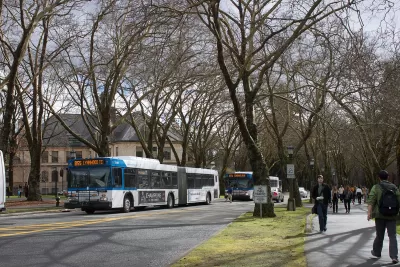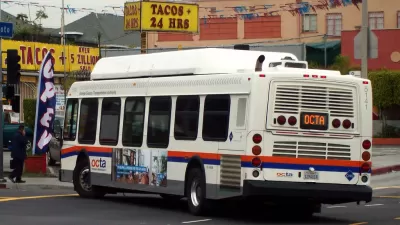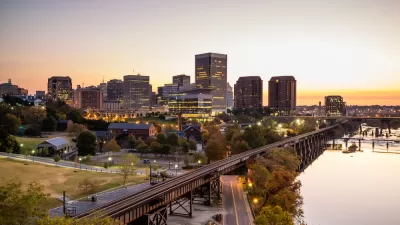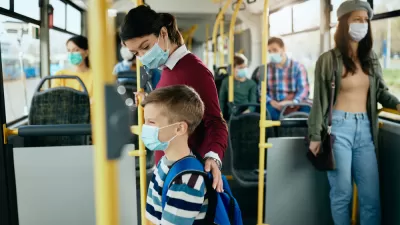A lack of access to affordable and reliable transit is being cited as a major reason why many college students don't finish school.

"At a time when colleges are increasingly focused on how to get and keep students enrolled and on a path to a degree, some of the most surprising challenges are not academic but logistical," writes Charlotte West. One of these challenges: affordable, reliable transportation.
With the majority of U.S. college students commuting to class, transportation can make a crucial difference for millions who cannot access or afford transit services. One study found that "Hispanic students were 19 percent more likely to report transportation problems as creating a barrier to college completion than non-Hispanics." Lack of access to transportation can lead students to miss classes and fall behind, while expensive car repairs and transportation costs can put students in even deeper debt.
In response, some colleges and cities have launched programs that provide low-cost or free transit passes and bring education closer to students with satellite campuses located near transit, sometimes funded with COVID-19 relief funds.
Rural students face their own set of challenges as they're often reliant on personal transportation in regions with sparse public transportation services. In these cases, colleges can help students by providing their own shuttle services or grants to help students pay for car repairs. According to research cited in the article, supporting effective and affordable transportation for students can have a positive impact on students' chances to stay enrolled and graduate, while advocates of fare-free transit argue that eliminating fares would increase equity and bring more people closer to economic opportunities and urban amenities.
FULL STORY: A surprising reason preventing some students from finishing college: Lack of transportation

Alabama: Trump Terminates Settlements for Black Communities Harmed By Raw Sewage
Trump deemed the landmark civil rights agreement “illegal DEI and environmental justice policy.”

Study: Maui’s Plan to Convert Vacation Rentals to Long-Term Housing Could Cause Nearly $1 Billion Economic Loss
The plan would reduce visitor accommodation by 25% resulting in 1,900 jobs lost.

Planetizen Federal Action Tracker
A weekly monitor of how Trump’s orders and actions are impacting planners and planning in America.

Waymo Gets Permission to Map SF’s Market Street
If allowed to operate on the traffic-restricted street, Waymo’s autonomous taxis would have a leg up over ride-hailing competitors — and counter the city’s efforts to grow bike and pedestrian on the thoroughfare.

Parklet Symposium Highlights the Success of Shared Spaces
Parklets got a boost during the Covid-19 pandemic, when the concept was translated to outdoor dining programs that offered restaurants a lifeline during the shutdown.

Federal Homelessness Agency Places Entire Staff on Leave
The U.S. Interagency Council on Homelessness is the only federal agency dedicated to preventing and ending homelessness.
Urban Design for Planners 1: Software Tools
This six-course series explores essential urban design concepts using open source software and equips planners with the tools they need to participate fully in the urban design process.
Planning for Universal Design
Learn the tools for implementing Universal Design in planning regulations.
Caltrans
Smith Gee Studio
Institute for Housing and Urban Development Studies (IHS)
City of Grandview
Harvard GSD Executive Education
Toledo-Lucas County Plan Commissions
Salt Lake City
NYU Wagner Graduate School of Public Service





























